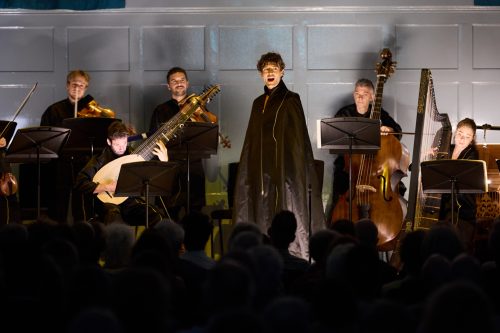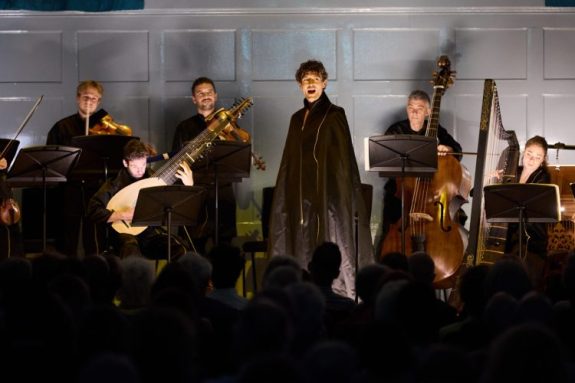
 United Kingdom Edinburgh International Festival [1]- Music from 17th Century Italy: Jakub Józef Orliński (countertenor), Il Pomo d’Oro. Queen’s Hall, Edinburgh, 3.8.2024. (SRT)
United Kingdom Edinburgh International Festival [1]- Music from 17th Century Italy: Jakub Józef Orliński (countertenor), Il Pomo d’Oro. Queen’s Hall, Edinburgh, 3.8.2024. (SRT)

The sunshine has been notably lacking from this year’s British summer, with Scotland no exception; but it came out for the start of August and, with it, the start of the Edinburgh Festivals. The festivals have been on the receiving end of a lot of gloomy news recently. There is the general story about arts funding, of course, but then there are Edinburgh-specific stories about the scarcity of accommodation and phenomenal costs of it for visitors and for performers. As if that wasn’t enough, another bin strike is planned for next week, timed to coincide with the city’s busiest period. No one is looking forward to seeing rubbish piled high in the streets, and let’s not even think about the smell.
Happily, however, the city felt vibrant and happy over the festivals’ opening weekend, with lots of visitors and the terrific bustle that you only get here in August. And there was plenty of bustle, energy and vibrancy in this opening concert of the International Festival’s Queen’s Hall series, pulling in a big-name singer to do his thing with some trusted collaborators.
It is rare to speak of a superstar countertenor, but if there is one then Jakub Józef Orliński is it. His youth and good looks make him eminently marketable but, more importantly, he is a properly skilled artist and spending ninety minutes with his voice is a rare pleasure. There is a cool beauty to it, luminous at the top without losing heft at the bottom, and he uses it terrifically. There is agility, flexibility and lots of power, but always a focus on the beauty of tone that’s so important to early and Baroque opera.
Furthermore, he’s an intelligent performer, because what he and his team created here wasn’t so much a conventional concert as a piece of immersive theatre. Running without interruption in a continuous sequence, the succession of arias and instrumental music didn’t exactly tell a story, but it explored a whole series of moods, mostly revolving around the many vicissitudes of love. Each gave Orliński a chance to demonstrate a different aspect of his voice, from Ottone’s confident return to Rome in Monteverdi’s Poppea, through to several arias of desolation and disappointment. There was even some comedy in his portrayal of an old woman in L’Adamiro, one still burning with passion for her husband despite the ravages of the years.
He was only half the story, though. His instrumental partners in Il Pomo d’Oro made up at least half of the programme’s success. A splash of Italian sunshine seemed to emanate from their sound, with gorgeously bright violin playing and a delightfully saucy cornetto sound. Miguel Rincon’s vibrant theorbo playing deserves a special mention, and he even managed a comedy duet with Orliński while he played the guitar.
This was the same programme Orliński did at the BBC Proms, and which formed the basis of his Beyond album (review here). As at the Royal Albert Hall, the Queen’s Hall auditorium was plunged into darkness and Orliński moved around the hall to sing, as well as deploying several costume changes to embody different characters. It all got a little much at the end when he seemed so taken with the audience’s response (‘who, me?!’) that he rolled out no fewer than four encores. And yes, there was even some breakdancing. But it if all got a bit silly then it still made for a hugely entertaining morning. The morning Queen’s Hall series normally features the much more rarefied world of string quartets and solo pianos: how on earth will they compete after a larger-than-life opening like this one?
Simon Thompson
The Edinburgh International Festival runs at venues across the city until Sunday 25th August. Click here for further details.
Monteverdi – ‘E pur io torno qui’ from L’incoronazione di Poppea; ‘Voglio di vita uscir’
Marini – ‘Passacalio’ from Per ogni sorte di strumento musicale Op.22
Caccini – ‘Amarilli, mia bella’ from Le nuove musiche
Frescobaldi – ‘Così mi disprezzate’ from Arie musicali, Book I
Kerll – Sonata for Two Violins in F
Strozzi – Cantate, ariette e duetti, Op.2: L’amante consolato
Cavalli – ‘Incomprensibil nume’ from Pompeo Magno
Pallavicino – Sinfonia from Demetrio
Netti – ‘Misero core’, ‘Si, si, si scioglia si’, ‘Dolcissime catene’ from La Filli
Sartorio – ‘La certezza di tua fede’ from Antonino e Pompeiano
Netti – ‘Quanto più la donna invecchia’ and ‘Son vecchia, patienza’ from L’Adamiro
Jarzębski – ‘Tamburetta’ from Canzoni e concerti
Moratelli – ‘Lungi dai nostri cor’ from La Faretra smarrita
